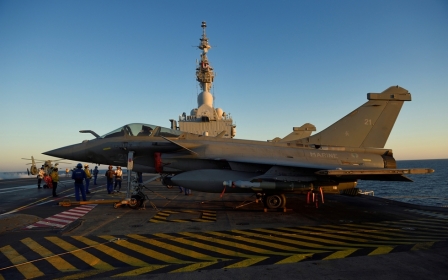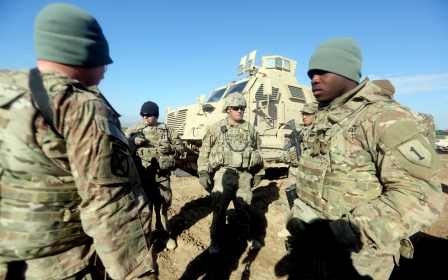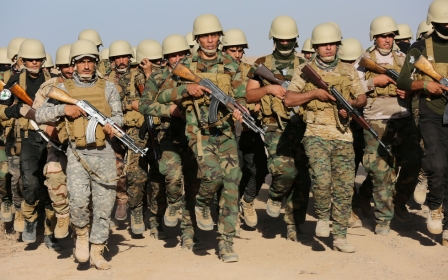Retaking Mosul: The first step on a rocky road towards Iraq's future
In a speech this week, Turkish President Recep Tayyip Erdogan confirmed a military offensive to retake Mosul will begin on 19 October, while the US announced the deployment of a further 600 troops to northern Iraq in preparation for the operation.
This was accompanied by an unprecedented level of diplomatic traffic through the city of Erbil over the past week as defence ministers and foreign secretaries from a wealth of Western and regional nations paid visits to oversee final preparations for the push to retake Iraq’s second-largest city.
But with President Barack Obama’s desire to see Mosul liberated from the Islamic State group (IS) before he leaves office driving the operation, many concerns among those working on the ground are being ignored. They are inconvenient for the politically motivated deadlines set in Washington and Baghdad.
Even former FBI director General David Petraeus has suggested things might be moving too fast. Last night he told PBS: "A number of us have said: don't clear unless you know how you're going to hold." It was a reminder that what comes after the capture of Mosul could be just as difficult as the operation itself.
No thought for refugees
Three camps with capacity for approximately 6,300 families have been constructed by Kurdish authorities, while camps constructed by Iraq’s Ministry of Migration and Displacement will provide refuge for perhaps another 20,000 families. Such capacity barely scratches the surface. As one UNHCR manager put it: “The US and Iraqi military are in complete denial: current camp construction needs to be increased 10-fold, but that isn’t going to happen. They simply won’t listen.”
This sentiment was echoed last week by Lise Grande, the deputy special representative of the United Nations Assistance Mission for Iraq, who spelt it out: “We are not ready.” She added: “It is not a question of a few camps. Literally we are talking about tens, hundreds of camps that have to be built.”
Alex Milutinovic, head of the International Rescue Committee, was even more pessimistic in an interview last week, claiming that the task simply couldn’t be done. He told The New Yorker: “The Iraqi government is determined to destroy ISIS [IS], but it is impossible to accommodate the number of refugees the military operation is going to produce.” The Iraqi government’s determination to defeat IS is critical, but just as critical should be its determination to successfully deal with the coming wave of displaced persons.
Indeed, with just weeks to go, the shortages extend to staffing, resources and perhaps most notably, funding. At least one major United Nations subsidiary is being forced to redirect staff and resources from Baghdad to the north. With the situation so fragile in other parts of the country, it’s clear that redirecting resources is going to leave other parts of the country less well equipped. Just last week, the UNHCR admitted that it had reached just 40 percent of its funding targets for the Iraq crisis.
Kurdish threat over IDPs
Hitherto, Kurdish authorities have been taken for granted on the issue of internally displaced persons (IDPs). Yet the Kurdish Regional Government at present hosts more than 1.5 million IDPs. It has been a critical, if unsung, sponge on the humanitarian front. However, there are signs that this hospitality is running thin, with Prime Minister Nechervan Barzani recently threatening to stop hosting IDPs if increases in foreign aid aren't forthcoming.
In response to this, European nations reacted quickly, with announcements of new aid donations totalling hundreds of millions of dollars.
Such poor humanitarian preparation risks further entrenching the widespread Sunni disenfranchisement that contributed to the rise of IS in the first place. A purely military approach to Mosul will fail to combat these underlying issues. The battle for Mosul needs to be seen in a holistic sense - it is far more than just a gun fight, or a battle against poverty.
Humanitarian work is often as much about prevention as it is treating the symptoms of a crisis, but the mood amongst humanitarian workers in Erbil is to a certain extent despondent. The humanitarian crisis is coming, whether they speak up or not. One thing that is clear is that it will be these very people who are left to plug the gaps in coalition and Iraqi planning once the disaster comes.
Reducing Mosul to rubble
And come it will. As air strikes pound the city, there is little doubt that much it will be reduced to rubble. This is just one of the reasons that displacement for the city’s poorest is likely to be long-term. At least six months, according to the UNHCR representative in Iraq, though most agree it will likely be far longer.
It will likely be many years before the rebuilding of Mosul can truly begin. A lack of preparation and interest in the humanitarian dimensions of the war against IS risks not only a humanitarian failure now but also risks laying the foundations for Iraq’s next war.
If several years down the line future coalition forces find themselves on the verge of launching yet another battle for Mosul, officials will not be able to say they weren’t warned.
- Gareth Browne is a journalist with an interest in current affairs, politics and the Middle East. His work has been featured in VICE, The Daily Mirror and Gulf News. @brownegareth
The views expressed in this article belong to the author and do not necessarily reflect the editorial policy of Middle East Eye.
Photo: Iraqi soldiers pose for a picture near Mosul (Reuters)
This article is available in French on Middle East Eye French edition.
New MEE newsletter: Jerusalem Dispatch
Sign up to get the latest insights and analysis on Israel-Palestine, alongside Turkey Unpacked and other MEE newsletters
Middle East Eye delivers independent and unrivalled coverage and analysis of the Middle East, North Africa and beyond. To learn more about republishing this content and the associated fees, please fill out this form. More about MEE can be found here.





